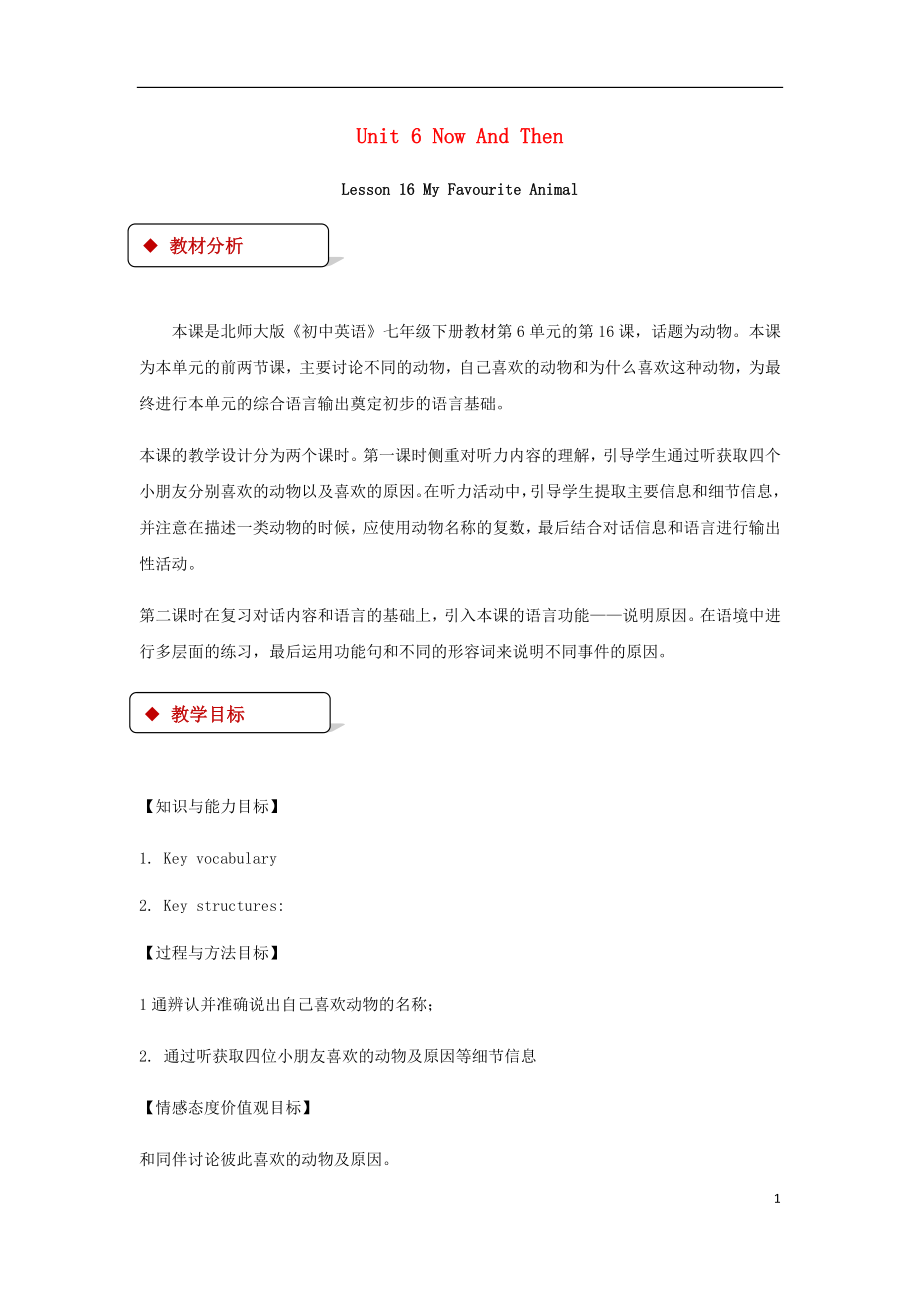《2018秋期七年級英語下冊 Unit 6 The Animal Kingdom Lesson 16 My Favourite Animal教案 (新版)北師大版》由會(huì)員分享����,可在線閱讀�����,更多相關(guān)《2018秋期七年級英語下冊 Unit 6 The Animal Kingdom Lesson 16 My Favourite Animal教案 (新版)北師大版(4頁珍藏版)》請?jiān)谘b配圖網(wǎng)上搜索�。
1���、
Unit 6 Now And Then
Lesson 16 My Favourite Animal
◆ 教材分析
本課是北師大版《初中英語》七年級下冊教材第6單元的第16課����,話題為動(dòng)物。本課為本單元的前兩節(jié)課����,主要討論不同的動(dòng)物����,自己喜歡的動(dòng)物和為什么喜歡這種動(dòng)物,為最終進(jìn)行本單元的綜合語言輸出奠定初步的語言基礎(chǔ)�。
本課的教學(xué)設(shè)計(jì)分為兩個(gè)課時(shí)。第一課時(shí)側(cè)重對聽力內(nèi)容的理解��,引導(dǎo)學(xué)生通過聽獲取四個(gè)小朋友分別喜歡的動(dòng)物以及喜歡的原因����。在聽力活動(dòng)中���,引導(dǎo)學(xué)生提取主要信息和細(xì)節(jié)信息,并注意在描述一類動(dòng)物的時(shí)候�,應(yīng)使用動(dòng)物名稱的復(fù)數(shù),最后結(jié)合對話信息和語言進(jìn)行輸出性活動(dòng)���。
第二課時(shí)
2����、在復(fù)習(xí)對話內(nèi)容和語言的基礎(chǔ)上���,引入本課的語言功能——說明原因�。在語境中進(jìn)行多層面的練習(xí)����,最后運(yùn)用功能句和不同的形容詞來說明不同事件的原因。
◆ 教學(xué)目標(biāo)
【知識(shí)與能力目標(biāo)】
1. Key vocabulary
2. Key structures:
【過程與方法目標(biāo)】
1通辨認(rèn)并準(zhǔn)確說出自己喜歡動(dòng)物的名稱�;
2. 通過聽獲取四位小朋友喜歡的動(dòng)物及原因等細(xì)節(jié)信息
【情感態(tài)度價(jià)值觀目標(biāo)】
和同伴討論彼此喜歡的動(dòng)物及原因。
【教學(xué)重點(diǎn)】
1. 提通辨認(rèn)并準(zhǔn)確說出自己喜歡動(dòng)物的名稱�����;
2. 通過聽獲取四位小朋友喜歡的動(dòng)物及原因等細(xì)節(jié)信息
【教學(xué)難點(diǎn)】
和同伴討論彼此喜
3��、歡的動(dòng)物及原因��。
◆ 課前準(zhǔn)備
◆
Tape recorder, Multimedia
◆ 教學(xué)過程
Step 1. Brainstorm
Tasks Ss to look at the pictures on P 65, and leads in the topic of this unit. · Ss brainstorm more animals in groups of 4, and write down their names on a piece of paper in one minute.
4�、
Step 2. Warm-up
T shows pictures and uses adjectives from Ex. 1 to describe pictures. ※T uses the plural form of animals when describing pictures.
Ss work in pairs, and describe pictures using the adjectives.
Ss share their description of pictures in class.
Step 3. Pre-reading
1
5、. Play the recording of the dialogue and ask the students to read aloud with the speaker.
2. Ss look at the table, and guess which animal the children may choose.
3. Ss can write down their own guesses in the table.
Step 4. Listening
1. listening · Ss listen and check prediction. (Ss complet
6����、e the ANIMAL column of the table in Ex. 2.)?What animals do the four children choose??· Ss check answers in class. ·
2. T asks Ss about the main topic of this dialogue.?What are the children talking about in the dialogue? 2nd?listening · Ss listen and circle the correct answers in the REASON colum
7、n of the table. (Ex. 3) · Ss check answers in pairs and then in class. · Ss work in pairs, and answer questions in Ex.
3.3rd?listening · Ss listen to the dialogue and fill in the blanks. · Ss discuss about their answers in pairs. Then T invites individual S to share their answers. · T plays the re
8����、cording separately, if some Ss still have problems with filling in the blanks.
4. Ss listen and read the dialogue after the recording. Ss need to look at the tapescripts on P 112.
Step 5. Work in pairs.
Ss work in groups of 4, and try to role-play the dialogue.
Ss can use the tapescripts on P
9、112. ·
Ss role-play the dialogue, using the information from it.
Step 6 Group talk:
You can use the following sentences to describe the changes about school, room, teacher, parents, classmates and town.
For example,
The trees are ______ now, but they were _______ before.
The canteen is _____ now, but it was __________before.
The building is _____now, but it was ___________before.
Step 7 Homework
1 完成Workbook Ex. 2����、4。
2. 寫一篇描述一種動(dòng)物的文章����,用上and、or��、but和so。
◆ 教學(xué)反思
略��。
4
 2018秋期七年級英語下冊 Unit 6 The Animal Kingdom Lesson 16 My Favourite Animal教案 (新版)北師大版
2018秋期七年級英語下冊 Unit 6 The Animal Kingdom Lesson 16 My Favourite Animal教案 (新版)北師大版

